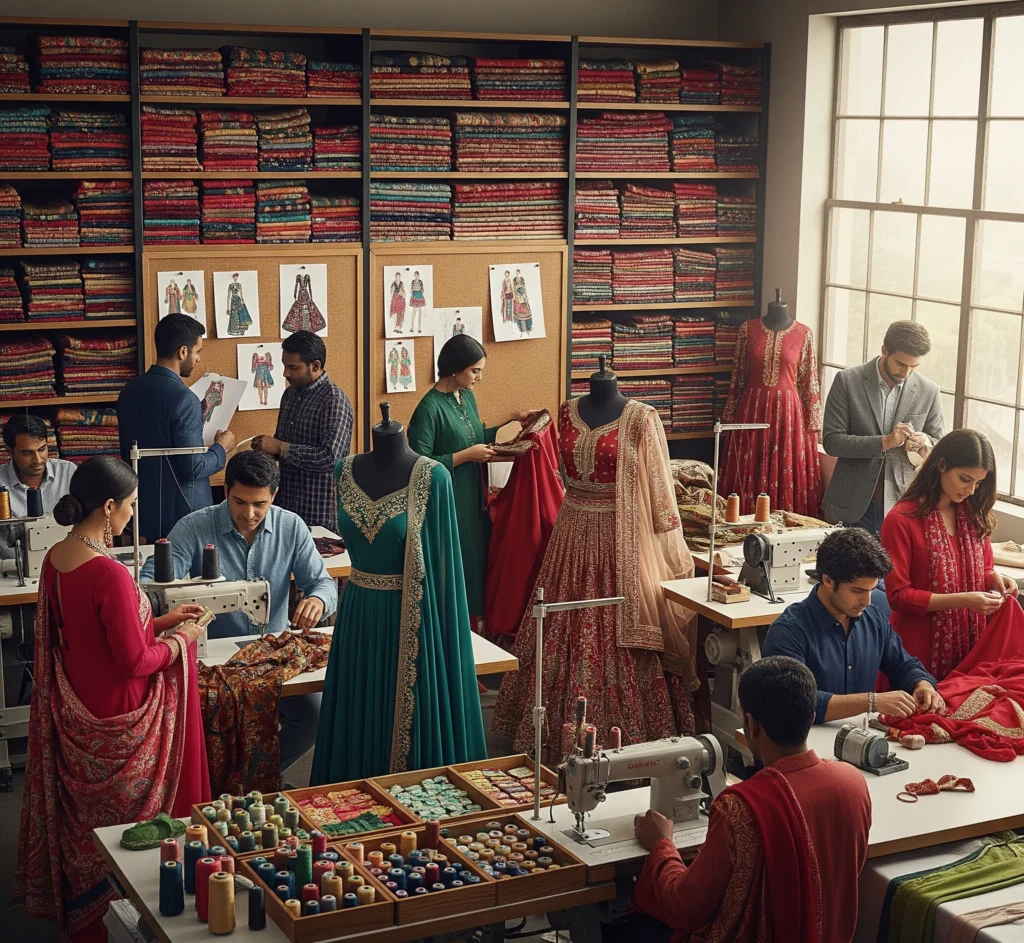This blog explores the growing challenge of rising material costs in the ethnic wear wholesale market in Mumbai and provides actionable solutions to overcome these financial hurdles.
The ethnic wear industry is facing a new challenge—rising material costs. From fabrics to embroidery threads, prices are climbing across the board. This has a direct impact on production, supply chains, and final retail prices. It’s affecting both small-scale artisans and large ethnic wear wholesale suppliers, forcing them to rethink sourcing strategies and pricing models. As input costs continue to rise, maintaining product quality and affordability has become increasingly difficult. The ethnic wear wholesale market in Mumbai is feeling the pressure, with many businesses adjusting operations to stay competitive in a price-sensitive industry.
Key Takeaways
Rising fabric and dye costs are increasing prices across the ethnic wear wholesale supply chain. This affects both quality and product variety.
Due to rising production costs, the ethnic wear wholesale market in Mumbai is seeing narrower profit margins and a decline in retailer demand.
Smart sourcing, simplified designs, and local materials help offset rising costs in the ethnic wear wholesale industry.
Businesses in the ethnic wear wholesale market in Mumbai must adapt quickly to stay competitive without compromising on quality.
Impact on Fabric Costs
The rising cost of raw fabrics is a major contributor to the increase. Cotton prices have gone up due to unpredictable weather conditions and high global demand. Silk, a staple in premium ethnic wear, is also more expensive because of limited supply and increased transportation costs. These materials are at the core of most ethnic garments.
Manufacturers who rely on consistent pricing are struggling to maintain profit margins. The increase in fabric prices pushes up the cost of every outfit. This affects suppliers, retailers, and customers alike.
Strain on Wholesalers and Retailers
The ethnic wear wholesale segment is particularly affected. Wholesale buyers must purchase in large volumes to secure better pricing. A small increase in material cost can significantly change the total expense. This makes it difficult to offer competitive pricing to retailers.
In the ethnic wear wholesale market in Mumbai, sellers are seeing a drop in demand from smaller retailers. Many store owners are now cutting down on orders or switching to cheaper alternatives. This leads to limited stock variety and fewer new collections entering the market.
Challenges in Maintaining Quality
To manage costs, some manufacturers are shifting from pure fabrics to blends. While this helps reduce expenses, it can affect the overall look and feel of the garments. Buyers in the ethnic wear wholesale space are cautious about such changes, as quality is critical for long-term business.
Dyes and embellishments are also getting expensive. The cost of chemical-based dyes has increased due to strict regulations and supply issues. Intricate handwork, zari, and embroidery are now more expensive because labor charges have also gone up. These details are essential in ethnic wear, and cutting corners is not an easy option.
Supply Chain Delays
The ethnic wear industry is also dealing with delays in the supply chain. Import restrictions and higher shipping costs mean longer wait times for fabric and accessories. This affects production timelines and leads to delayed launches of seasonal collections. For wholesalers in fast-moving markets like the ethnic wear wholesale market in Mumbai, this is a serious concern.
When collections arrive late, retailers miss key festivals and wedding seasons. This directly affects sales and inventory turnover. Planning ahead has become harder, especially when costs and availability are unpredictable.
How to Overcome the Challenges?
There are several ways for businesses in the ethnic wear industry to manage rising material costs:
Source Locally Buying materials from local suppliers can reduce transportation costs. It also supports local artisans and improves supply timelines. Local sourcing helps ensure faster replenishment, better communication, and stronger control over material quality.
Use Fabric Blends Smartly While pure fabrics are ideal, some blends can offer good quality at a lower cost. Choosing the right blend helps maintain both pricing and aesthetics. It also allows for better fabric durability, flexibility in design, and more accessible price points for bulk buyers in the ethnic wear wholesale sector.
Simplify Designs Reducing overly complex embroidery or heavy embellishments can help lower production costs without affecting overall style. Simpler styles also appeal to modern tastes, reduce turnaround time, and make the pieces more versatile across occasions and regions.
Buy in Bulk For those in the ethnic wear wholesale trade, bulk buying from trusted suppliers in the ethnic wear wholesale market in Mumbai can help lock in better rates. Bulk orders often come with discounts, priority service, and reduced per-piece costs, which can significantly improve profit margins over time.
Build Strong Supplier Relationships Partnering with reliable vendors ensures priority during high-demand seasons and more flexibility in pricing. Long-term relationships also lead to consistent supply quality, better credit terms, and early access to new fabric collections or exclusive deals in the ethnic wear wholesale space.
Use Technology Managing inventory, forecasting trends, and streamlining production through software can reduce waste and increase efficiency. It also helps track seasonal demand, improve order accuracy, and support data-driven decisions for businesses operating in fast-moving wholesale markets.
Stay Updated on Trends Monitoring customer preferences can help businesses focus on styles that are in demand and avoid overproduction of slow-moving items. Following fashion trends also allows wholesalers to launch timely collections, attract younger buyers, and stay ahead in the competitive ethnic wear wholesale market.
Rising material costs are reshaping how the ethnic wear industry operates. Every part of the supply chain is affected. From production units to retailers in the ethnic wear wholesale market in Mumbai, everyone is adjusting to new pricing models. The key to success lies in adaptability. Businesses that stay informed, manage resources well, and maintain quality will survive this shift. Working smarter with sourcing, design, and production can help control expenses without losing market appeal.
Esika World blends tradition with modern style, bringing curated ethnic wear collections straight from the heart of the ethnic wear wholesale market in Mumbai. From timeless classics to trend-forward pieces, we focus on quality, comfort, and affordability. Esika World also is leading designer kurtis manufacturers Discover fashion that celebrates culture and if you are looking for something specific in ethnic wear? We’re eager to hear from you. Start a conversation with us today!


